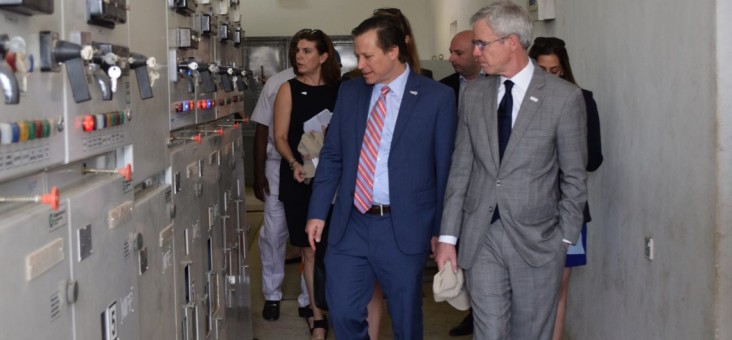
Observations after a three day visit to Nigeria
For Immediate Release
During a three-day visit to Nigeria, ‘Power Africa’ Coordinator Andrew M. Herscowitz reaffirmed the longstanding commitment of the United States to improving power in Nigeria and observed that U.S. support was already “making a difference” in the troubled sector.
On Monday, Herscowitz visited the Abuja Electricity Distribution Company, where he spoke with stakeholders regarding its challenges to modernize and make its operations more efficient. Power Africa, through USAID, provides direct management and technical support to distribution companies in Abuja, Benin, and Eko states to implement an aggressive management plan to boost the firm’s efficiency and cash flow.
“Power Africa will continue our work in Nigeria to increase access to electricity,” Herscowitz said. “Our commitment to Africa’s growth and development is strong. Our programs are already making a difference.”
Over half of all Nigerians, 95 million people still do not have access to electricity, and those who are connected to the grid suffer from extensive power outages. A lack of reliable and affordable supply of electricity affects every facet of life.
“Well functioning DISCOs not only improve customer satisfaction but also attract more private investment and safeguard generated power from being ‘lost’ or ‘stranded’ by lack of distribution and transmission capacity,” he said. “We are seeing that effective management can reduce losses.”
In the course of the visit, Herscowitz discussed the many complex issues facing the power industry faces with government officials, legislators, and private sector entities, and reconfirmed Power Africa’s support for the industry from production to distribution.
On Tuesday, Herscowitz witnessed the signing of a Memorandum of Understanding between Community Energy Social Enterprises Ltd., a Nigerian renewable energy company, and Renewvia Energy Corporation, a U.S. company, which outlines their cooperation to develop solar micro grids in 25 communities across Nigeria. Once fully installed, these facilities will produce approximately five megawatts of electricity and bring power to over 10,000 households.
The signing was part of a two-day workshop for DISCOs across Nigeria to share the lessons learned. Feedback from the workshop will inform the design for a possible expansion of the DISCO support program to an additional eight distribution companies.
Power Africa is also supporting broader reform efforts assisting the Bureau of Public Enterprise during the privatization of the successor generation and distribution companies and with developing the blue print for transmission investment. “Without sufficient transmission capacity and stronger regulatory capacity, increased generation doesn’t mean much,” he said.
Power Africa draws on the combined expertise and abilities of 12 U.S. government agencies, the World Bank Group, the African Development Bank, the governments of Sweden, Norway, Canada, the International Renewable Energy Agency, African governments, and private sector partners.







Comment
Make a general inquiry or suggest an improvement.